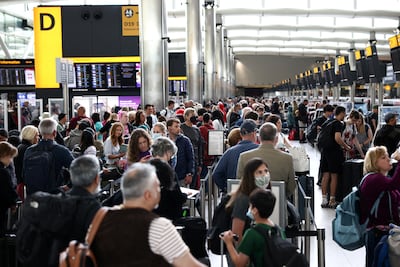The chief executive of London's Heathrow Airport John Holland-Kaye is stepping down after nine years as the boss of Britain's busiest airport.
During his tenure, Mr Holland-Kaye oversaw the development of the plan for Heathrow's expansion, as well as navigating the business through the Covid-19 crisis and the subsequent recovery in demand.
“John has been an extraordinary leader of Heathrow”, said Lord Deighton, chairman of the airport.
“During the past nine years, he has worked tirelessly and collaboratively with shareholders, ministers, airlines and other stakeholders to ensure the country can be proud of its 'front door'."
The board said it had started the process to select his successor. Mr Holland-Kaye wants to leave at some point this year but will remain as chief executive until his replacement starts.
Heathrow is owned by Spanish group Ferrovial and Qatar Investment Authority, as well as other investors.

One of Mr Holland-Kaye's first tasks as chief executive was to gain support for a planned third runway, an issue that was charged with political and environmental concerns.
Not long after the British Parliament had given its backing for the expansion, the pandemic struck, bringing most travel to a standstill for months at a time.
The spread of the coronavirus led to an unprecedented collapse in passenger numbers and caused Heathrow to accumulate more than £4 billion ($4.93 billion) in losses throughout the pandemic.
As the threat from the virus slowly receded and demand for travel returned, Mr Holland-Kaye was often heard in the media calling for ministers to drop Covid-19 testing and quarantining requirements, and fully reopen travel to and from the UK.
Turbulent relationship
Mr Holland-Kaye had a turbulent relationship with airlines.
Only this week, Virgin Atlantic and British Airways parent IAG criticised the Civil Aviation Authority (CAA) for raising Heathrow's price cap — the sum airlines pay to the airport per passenger, which this year is £31.57, up from £30.19.
Heathrow was lobbying for an even higher figure of £41.95.
The airlines accused the CAA of relying on passenger number forecasts from Heathrow that, they claimed, were at the low end of expectations, which the airport denied.

Chaos and cancellations
Due to the pandemic, Heathrow and the airlines were left with enormous gaps in their resources, chiefly because it proved a timely process to rehire and retrain staff who had been furloughed or laid off.
This led to huge queues, long waiting times and flight cancellations at Heathrow, which by July last year had to place a daily capacity limit of 100,000 passengers that could travel through the airport.
The disruption infuriated both passengers and airlines and Mr Holland-Kaye wrote an open letter to customers, saying: “We recognise that this will mean some summer journeys will either be moved to another day, another airport or be cancelled and we apologise to those whose travel plans are affected.”
Many airlines such as Emirates refused to adhere the passenger cap, claiming Heathrow should have been better prepared and had shown "blatant disregard" for customers.
Emirates said it was puzzled about how Heathrow arrived at the 100,000 figure, suggesting it had been "plucked from thin air".
Heathrow has not commented further on the reasons for Mr Holland-Kaye's resignation nor on what he plans to do next.


